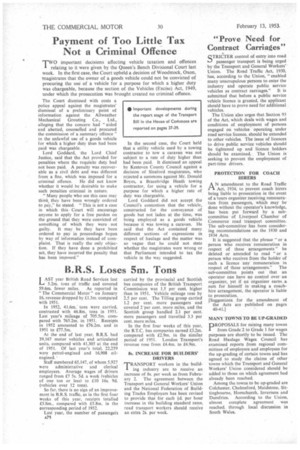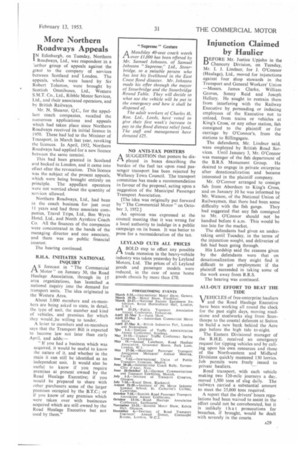"Prove Need for Contract Carriages" •
Page 30

Page 31

If you've noticed an error in this article please click here to report it so we can fix it.
STRICTER control of entry into road passenger transport is being urged by the Transport and General Workers' Union. The Road Traffic Act, 1930, has, according to the Union, "enabled many unscrupulous persons to enter the industry and operate public service
vehicles as contract carriages." It is submitted that before a public service vehicle licence is granted, the applicant should have to prove need for additional vehicles.
The Union also urges that Section 93 of the Act, which deals with wages and conditions of employment of persons engaged on vehicles operating under road service licence, should be extended to other vehicles. The issue of licences to drive public service vehicles should be tightened up and licence holders should be examined. The Union is seeking to prevent the employment of part-time drivers.
PROTECTION FOR COACH HIRERS
AN amendment to the Road Traffic Act, 1934, to prevent coach hirers being liable to prosecution in the event of a -tours organizer receiving remuneration from passengers, which may be done without the operator's knowledge, has been put forward by a subcommittee of Liverpool Chamber of Commerce road transport committee. The sub-committee has been considering recommendations on the 1930 and 1934 Acts.
It is suggested that the phrase "or a person who receives remuneration in respect of these arrangements" be deleted or amended to read "or a person who receives from the holder of such a licence any remuneration in respect of these arrangements." The sub-committee points out that an operator can have no control over an organizer, yet if an organizer earns a sum for himself in making a coachhire arrangement, the operator is liable to prosecution.
[Suggestions for the amendment of • the Acts are published on pages 40-41.) MANY TOWNS TO BE UP-GRADED
PROPOSALS for raising many towns from Grade 2 to Grade 1 for wages purposes are shortly to be issued. The Road Haulage Wages Council has examined reports from regional committees of employers and employees for the up-grading of certain towns and has agreed to study the claims of other towns which the Transport and General Workers' Union considered should be added to those on which agreement had already been reached.
Among the towns to be up-graded are Colchester, Chelmsford, Maidstone, Sittingbourne, Hornchurch, Inverness and Dumfries. According to the Union, almost complete agreement was reached. through local discussion in South Wales.
More Northern Roadways Appeals
IN Edinburgh, on Tuesday, Northern I Roadways, Ltd., was respondent in a
'urther group of appeals against the grant to the company of services between Scotland and London. The appeals, which were heard by Sir Robert Tolerton, were brought by Scottish Omnibuses, Ltd., Western S.M.T. Co., Ltd., Ribble Motor Services, Ltd., and their associated operators, and by British Railways.
Mr. N. Shearer, Q.C., for the appellant coach companies, recalled the numerous applications and appeals which had taken place since Northern Roadways received its initial licence in 1950. These had led to the Minister of Transport, in March last year, revoking the licences. In April, 1952, Northern Roadways had applied for a new licence between the same termini.
This had been granted in Scotland and backed in London, and it came into effect after the revocation. This licence was the subject of the present appeals, which were being brought entirely on principle. The appellant operators were not worried about the quantity of services allowed.
Northern Roadways, Ltd., had been in the coach business for just over II years and had three associate corn-. panics, Travel Trips, Ltd., Ben Wyvis Hotel. Ltd., and North Ayrshire Coach Co. All the finances of the companies were concentrated in the hands of the managing director and one associate, and there was no public financial interest.
The hearing continued.
R.H.A. INITIATES NATIONAL INQUIRY
AS forecast in "The Commercial Motor" on January 30, the Road Haulage Association, through its 15 area organizations, has launched a national inquiry into the demand for transport units. The idea originated in the Western Area.
About 3.000 members and ex-mem bers are being asked to state, in detail, the type of unit, the number and kind of vehicles, and premises for which they would..be willing to tender.
A letter to members and ex-members says that the Transport Bill is expected to become law not later than early April, and adds:— " If you had a business which was acquired, it would be useful to know the nature of it, and whether in the main it can still be identified as an independent unit. It would also be useful to know if you require premises at present owned by the Road Haulage Executive; if you would be prepared to share with other purchasers some of the larger premises occupied by the B.T.C.; or if you know of any premises which were taken over with businesses acquired which are still owned by the Road Haulage Executive but not used by them." NO ANTI-TAX POSTERS
A SUGGESTION that posters be digr played in buses describing the burden of the fuel tax upon road passenger transport has been rejected by Wallasey Town Council. The transport committee has made a recommendation in favour of the proposal, acting upon a suggestion of the Municipal Passenger Transport Association.
[The idea was originally put forward by "The Commercial Motor" on October 3, 1952.1 An opinion was expressed at the council meeting that it was wrong for a local authority to indulge in a public campaign on its buses. It was better to press for a reconsideration of the tax.
LEYLAND CUTS ALL PRICES A BOLD step to offset any possible r-k trade recession in the heavy-vehicle industry was taken yesterday by Leyland Motors, Ltd. The prices of all Leyland goods and passenger models were reduced, in the case of some home goods chassis by more than £70.
Injunction Claimed by Haulier
BEFORE Mr. Justice Upjohn in the Chancery Division, on Tuesday, Mr. I. J. Lindner, for J. O'Connor (Haulage), Ltd., moved for injunctions against four shop stewards in the Transport and General Workers' Union —Messrs. James Clarke, William Groves, Sonny Reid and Joseph Hellery. He sought to restrain them from interfering with the Railway Executive by persuading or inducing employees of the Executive not to unload, from trains or vehicles at King's Cross, or any other station, fish consigned to the plaintiff or for carriage by O'Connor's, from the stations to Billingsgate.
The defendants, Mr. Lindner said, were employed by British Road Services. Until January 3, Mr. O'Connor was manager of the fish department of the B.R.S. Monument Group. He desired to engage in private enterprise after denationalization and became interested in the plaintiff company.
Mr. O'Connor arranged to consign fish from Aberdeen to King's Cross, and on January 10 he was informed by Mr. Watson, of the National Union of Railwaymen, that there had been some difficulty with the fish gangs. They had suggested that any fish consigned to Mr. O'Connor should not be handled before 6 a.m. This would be too late for the market.
The defendants had given an undertaking until Tuesday, in the terms of the injunction sought, and deliveries of fish had been going through.
His Lordship said the reasons given by the defendants were that on denationalization they might find it difficult to get employment if the plaintiff succeeded in taking some of the work away from B.R.S.
The hearing was continued.
All-OUT EFFORT TO BEAT THE TIDE
VEHICLES of free-enterprise hauliers V and the Road Haulage Executive have been working all round the clock for the past eight days, moving roadstone and steelworks slag from Scunthorpe to the coastal defences at Sutton to build a new bank behind the Acre gap before the high tide to-night.
The Eastern Divisional manager of the R.H.E. received an emergency request for tipping vehicles and by calling upon his own resources and those of the North-eastern and Midland Divisions quickly mustered 130 lorries. Job permits were freely issued to private hauliers.
Road transport, with each vehicle making two 120-mile journeys a day, moved 1,500 tons of slag daily. The railways carried a substantial amount to meet the 25,000 tons required.
A report that the drivers' hours regulations had been waived to assist in the effort could not be corroborated, but it is unlikely that prosecutions for breaches, if brought, would be dealt with severely in the courts.




















































































